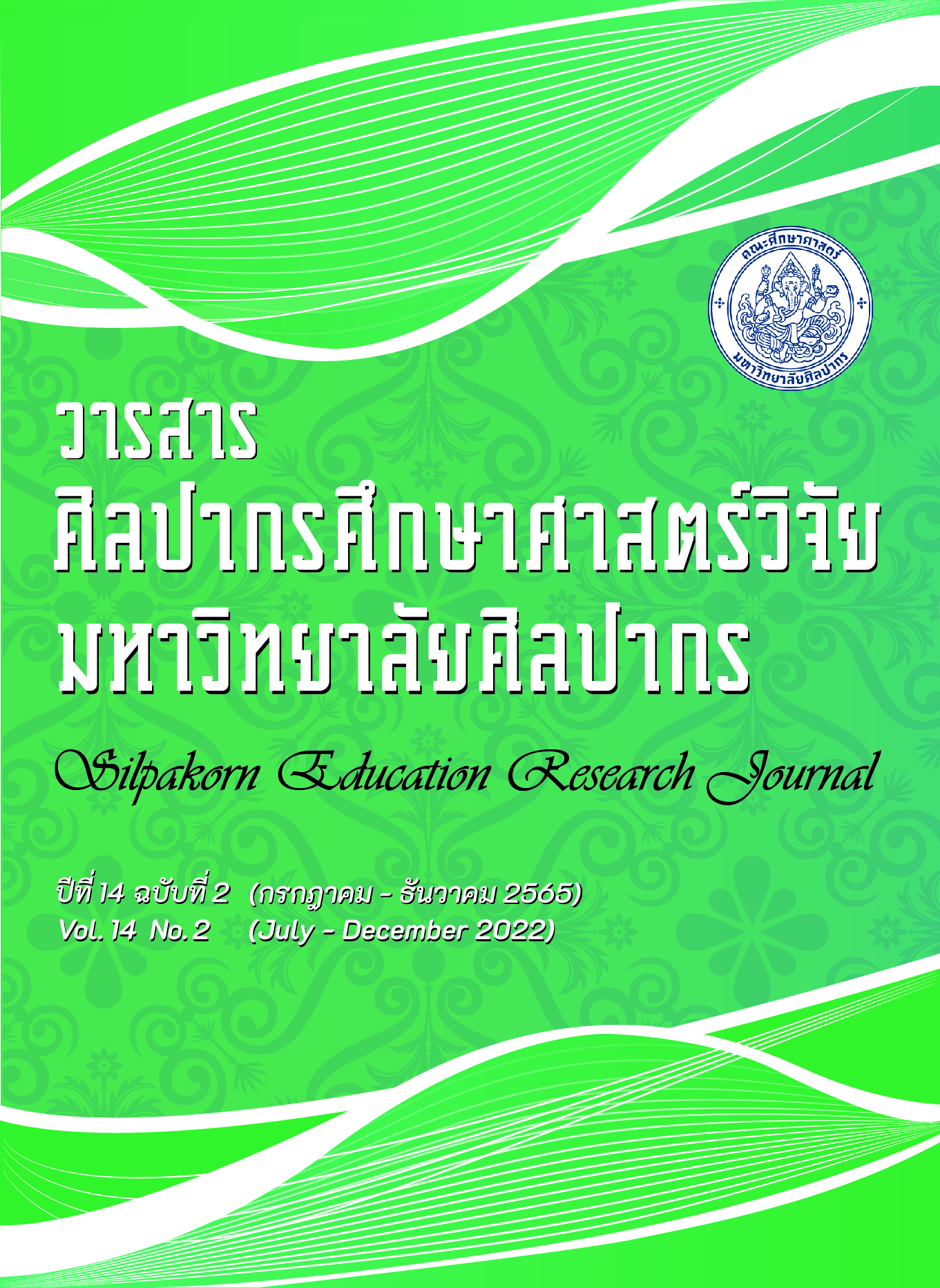ผลการจัดกิจกรรมการเรียนรู้วิทยาศาสตร์โดยใช้แนวคิดปรากฏการณ์เป็นฐาน ที่มีต่อความสามารถในการคิดอย่างมีวิจารญาณของนักเรียนมัธยมศึกษาตอนปลาย
คำสำคัญ:
แนวคิดปรากฏการณ์เป็นฐาน, การจัดการเรียนรู้โดยใช้ปรากฏการณ์เป็นฐาน, ความสามารถในการคิดอย่างมีวิจารณญาณบทคัดย่อ
การวิจัยครั้งนี้มีวัตถุประสงค์เพื่อ 1) เพื่อเปรียบเทียบความสามารถในการคิดอย่างมีวิจารณญาณของนักเรียนก่อนและหลังการจัดกิจกรรมการเรียนรู้ตามแนวคิดปรากฏการณ์เป็นฐาน 2) เพื่อศึกษาการเปลี่ยนแปลงความสามารถในการคิดอย่างมีวิจารณญาณของนักเรียนเมื่อได้รับการจัดกิจกรรมการเรียนรู้ตามแนวคิดปรากฏการณ์เป็นฐาน กลุ่มตัวอย่าง ได้แก่ นักเรียนชั้นมัธยมศึกษาปีที่ 4 ของโรงเรียนขนาดใหญ่พิเศษแห่งหนึ่งในสังกัดสำนักงานแขตพื้นที่การศึกษามัธยมศึกษา เขต 1 จำนวน 44 คน เครื่องมือที่ใช้ประกอบด้วย แบบวัดความสามารถในการคิดอย่างมีวิจารณญาณ แบบสังเกตการเปลี่ยนแปลงความสามารถในการคิดอย่าง มีวิจารณญาณ และแผนการจัดการเรียนรู้วิทยาศาสตร์ตามแนวคิดปรากฏการณ์เป็นฐาน วิเคราะห์ข้อมูลด้วยสถิติค่าเฉลี่ยเลขคณิต ร้อยละ ส่วนเบี่ยงเบนมาตรฐาน การทดสอบค่าทีและการวิเคราะห์เนื้อหา ผลการวิจัยพบว่า 1) นักเรียนมีคะแนนเฉลี่ยของความสามารถในการคิดอย่างมีวิจารณญาณหลังเรียนสูงกว่าก่อนเรียนอย่างมีนัยสำคัญทางสถิติที่ระดับ .05 และเมื่อพิจารณาจำแนกตามองค์ประกอบ พบว่า องค์ประกอบทั้ง 5 องค์ประกอบ ได้แก่ 1) การระบุประเด็นปัญหา 2) การรวบรวมข้อมูลหรือหลักฐาน 3) การตั้งสมมติฐาน 4) การสรุปอ้างอิง และ 5) การประเมินข้อสรุป นักเรียนมีคะแนนเฉลี่ยหลังเรียนสูงกว่าก่อนเรียนทุกองค์ประกอบอย่างมีนัยสำคัญทางสถิติที่ระดับ .05 2) ความสามารถในการคิดอย่างมีวิจารณญาณของนักเรียนที่เรียนจากการจัดการเรียนรู้วิทยาศาสตร์ตามแนวคิดปรากฏการณ์เป็นฐานมีการเปลี่ยนแปลงในลักษณะที่ดีขึ้น ทั้งในภาพรวมและเมื่อจำแนกตามองค์ประกอบ
เอกสารอ้างอิง
Amornchewin, B. (2013). Critical Thinking. Bangkok: Parbpim Printing. (in Thai)
Black, B. (2012). “An Overview of a Programme of Research to Support the Assessment of Critical Thinking”. Thinking Skills and Creativity 7(2): 122-133.
Butkatanyoo, O. (2018). “Phenomenon Based Learning for Developing a Learner’s Holistic Views and Engaging in the Real World”. Journal of Education Studies Chulalongkorn University 46(2): 348-365. (in Thai)
Chuysawat, T. (2021). An Action Research on the Phenomenon - Based Learning on Chemical Kinetics for Eleventh Grade Students to Enhance Learning Achievement and Critical Thinking Skill. Master of Education Thesis Program in Science Teaching Burapha University. (in Thai)
Daehler, K., and Folsom, J. (2016). Making Sense of SCIENCE: Phenomena-Based Learning. [Online]. Retrieved March 10, 2020, from http://wemss.weebly.com/uploads/8/6/4/9/
Ennis, R. (1995). “Critical Thinking: A Streamlined Conception”. Teaching Philosophy 14(1): 5-24.
Facione, PA. (2020). Critical Thinking: What It Is and Why It Counts 2020 Update. [Online]. Retrieved March 20,2019 from https://www.insightassessment.com/article/critical-thinking-what-it-is-and-why-it-counts.
Islakhiyah, K., Sutopo., and Yuliat, L. (2016). Phenomenon Based Learning to Improve Scientific Reasoning Ability in Natural Science Learning in Junior High School. Pros. Semnas Pend. IPA Pascasarjana UM, 1 (992-1005).
Mahavijit, P. (2017). “Phenomenon Learning From Finland”. IPST Magazine 46(3): 40-45. (in Thai)
Mahavijit, P. (2019). “Application of Phenomenon-based Learning and Active Learning in Elementary Education Course to Enhance 21st Century Learning Skills”. Journal of Education Khon kaen University 42(2): 73-90. (in Thai)
Marasri, S. (2019). “Developing Critical Thinking Skills in the 21st Century”. Journal of MCU Nan 3(2): 105-122. (in Thai)
Moonkam, S. (2007). Critical Thinking Teaching Strategies. Bangkok: Parbpim. (in Thai)
National Institute of Educational Testing Service. (2020). Summary of Ordinary National Educational Test Result of Grade 12 Students in Academic Year 2019. [Online]. Retrieved February 20, 2019, from https://www.niets.or.th/en/catalog/view/2211
Office of Higher Education Science, Research and Innovation Royal Thai Embassy Washington D. C. (2016). Scientific Literacy. [Online]. Retrieved February 28, 2019, from https:// ohesdc.org/th/home. (in Thai)
Office of the Education Council. (2017). The National Scheme of Education B.E. 2017-2036. Bangkok: Prigwhan Graphic. (in Thai)
Office of the National Economic and Social Development Council. (2017). The National Economic and Social Development Plan (2017-2021). [Online]. Retrieved February 28, 2019, from https://www.nesdc.go.th/main.php?filename=develop_issue. (in Thai)
Panyapiwat Institute of Management. (2014). 21st Century Skills. [Online]. Retrieved February 28, 2019, from https://edu.pim.ac.th/video/2/21st-century-skills-21.html. (in Thai)
Pengsantia, H. (2020). Effects of Learning Management by Using Phenomenon-based Learning on Critical Thinking and Creative Thinking of Grade 12 Students. Master of Education Thesis Program in Educational Measurement, Evaluation, and Research of Srinakharinwirot University. (in Thai)
Robert H. Ennis. (2013). Critical Thinking Across the Curriculum (CTAC). OSSA Conference Archive. 44. [Online]. Retrieved March 10, 2020, from https://philpapers.org/rec/ENNCT A-3
Royal Society of Thailand. (2015). Dictionary of Contemporary Academic Terms Royal Thai Council. Bangkok: National Assembly Library of Thailand. (in Thai)
Saiyasit, P. (2018). Development of Cloud Based Flipped Classroom Model Using Problem Based Learning in Multicultural Society to Enhance Critical Thinking. Doctor of Thesis Program in Educational Technology and Communications Graduate School Chulalongkorn University. (in Thai)
Silander, P. (2015). Digital Pedagogy. In P. Mattila, and P. Silander (Eds.), How to Ccreate the School of the Future: Revolutionary Thinking and Design from Finland (pp. 9-26). Oulu: University of Oulu, Center for Internet Excellence.
________. Rubric for Phenomenon Based Learning. Retrieved March 10, 2020, from http://www.phenomenaleducation.info/phenomenon-based-learning.html.8649828/m
ss_phenomena-based_learning.pdf
Sintapanon, S., and et al. (2012). Develop Thinking Skills in Line with Educational Reforms. Bangkok: Technic Printing. (in thai)
Susaorat, P. (2013). Thinking Development. Bangkok: Technic Printing. (in Thai)
The Institute for the Promotion of Teaching Science and Technology. (2008). Knowledge and Scientific Competencies for 21th Century. Bangkok: Seven Printing Group. (in Thai)
The Institute for the Promotion of Teaching Science and Technology. (2018). PISA 2018 Results. [Online]. Retrieved February 28, 2019, from https://pisathailand.ipst.ac.th/news-12/. (in Thai)
Watson, G. and Glaser, E., (2002). Watson - Glaser Critical Thinking Appraisal – UK Edition Practice Test. Pearson Assessment, 80 Strand, London, England.
World Economic Forum. (2016). The Future of Jobs: Employment, Skills, and Workforce Strategy for the Fourth Industrial Revolution. [Online]. Retrieved March 12, 2020 from http://reports. weforum.org/future-of-jobs-2016/.
Zhukov, T. (2015). Phenomenon-Based Learning: What is PBL. [Online]. Retrieved March 10, 2020, from https://www.noodle.com/articles/phenomenon-based-learning-what-is-pbl





